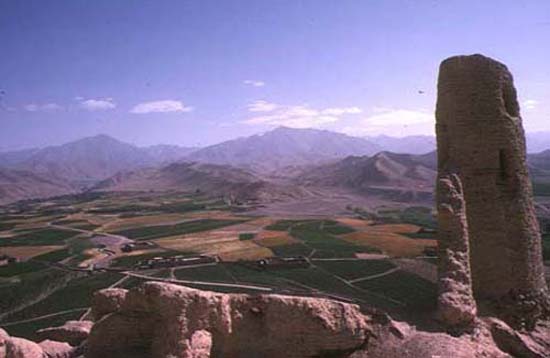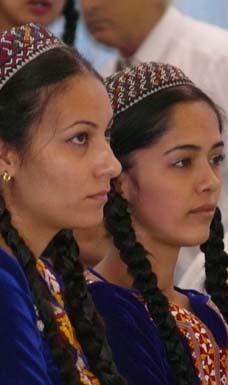
In truth, the U.S. military may be the most resilient part of American society right now. The soldiers are clearly in better shape than the political class that sent them to war and the economic leadership that has mismanaged the economy. (I'd give the same high marks to young civilians who are serving and sacrificing in hard places -- the Peace Corps and medical volunteers I've met abroad and the teachers in tough inner-city schools.) Through all its difficulties, the military has kept its stride. That sense of balance comes partly from the fact that soldiers are anchored to the American bedrock. This includes the stereotypical small towns in the South and Midwest that have military service in their DNA. But it also counts plenty of hardworking, upwardly mobile Hispanic and African American families in urban America that produce some of the best soldiers I know.
David Ignatius writes: I'd give the same high marks to young civilians who are serving and sacrificing in hard places -- the Peace Corps and medical volunteers I've met abroad and the teachers in tough inner-city schools
Standing tall in harm's way
U.S. Joint Chiefs of Staff Adm. Mike Mullen, right, gives commander's coins to soldiers in Wardak province, Afghanistan.
By David Ignatius
Wednesday, November 11, 2009
In the aftermath of the Fort Hood shootings, some commentaries have examined the damage to the U.S. Army from the wars in Iraq and Afghanistan. A few have spoken about the alleged shooter, Maj. Nidal M. Hasan, as an extreme version of what can happen with an overstressed force.
This picture of a traumatized military is misleading. Certainly, the Army and the other services are stressed by the demands of combat. But what's striking to me this Veterans Day is how healthy the military is, given all the weight it has been carrying for the country these past eight years.
Facing a new and disorienting kind of warfare, the military has learned and adapted. Rather than complain about their problems, soldiers have figured out ways to solve them.
In truth, the U.S. military may be the most resilient part of American society right now. The soldiers are clearly in better shape than the political class that sent them to war and the economic leadership that has mismanaged the economy. (I'd give the same high marks to young civilians who are serving and sacrificing in hard places -- the Peace Corps and medical volunteers I've met abroad and the teachers in tough inner-city schools.)
Through all its difficulties, the military has kept its stride. That sense of balance comes partly from the fact that soldiers are anchored to the American bedrock. This includes the stereotypical small towns in the South and Midwest that have military service in their DNA. But it also counts plenty of hardworking, upwardly mobile Hispanic and African American families in urban America that produce some of the best soldiers I know.
ad_icon
I had the pleasure of living in the military family when I traveled for 2 1/2 weeks recently with U.S. Central Command. What I heard, listening into the military's unscripted conversations, were the wisecracks and dark humor of soldiers trying to make the best of a hard situation. But there was also the satisfaction of fighting these tough and sometimes thankless wars: The troops don't boast about it, but they are very proud of what they have managed to accomplish.
For a journalist, traveling with the military is a bracing antidote to privilege. It's about dorm rooms and bunk beds, and roommates who snore. It's about chow halls that serve so much food it makes your eyes pop every morning -- we're talking eggs and bacon, ham, patty sausages and link sausages (two kinds), and we haven't even gotten to toast and cereals.
It's a world of outdoor latrines that get pretty rank in the midday sun. (I'll never forget the hand-lettered sign a few years ago at a base somewhere in Iraq, with an arrow pointing down to the dank hole and the words: "I found the Iraqi WMD.")
We visited all the stress points -- Iraq, Afghanistan, Pakistan. At nearly every stop, the Centcom commander, Gen. David Petraeus, asked people who had been deployed for two combat tours to come forward and receive one of his "commander's coins" for special service. There were always long lines. You could only wonder at the spouses and children left home, the marriages gone bad, the personal courage of the men and women who had returned to the line of fire again and again.
I saw many images that conveyed the pain of long and repeated deployments. One I remember vividly was a noncommissioned officer at an air base in the Gulf. She was talking by computer with her kids, trying to help keep things together at home and school just a little longer. "Mommy will be home soon," she kept saying. "Mommy will be home soon." But that homecoming is probably still months away.
Another image is of an Army officer who was deployed to Iraq continuously for 36 months, an unimaginably long time. On one long C-17 flight, he opened a canvas bag and spread out all his unanswered correspondence and unpaid bills, trying to dig out from under.
The pluckiest combat unit I encountered was the Minnesota National Guard, known as the Red Bulls. I met those citizen-soldiers in Basra, Iraq, where they have responsibility for the entire southern tier of the country. Petraeus gave them a pep talk about the importance of working with the Iraqi security forces as other American troops come home. What stuck in my mind was the resounding shout from the men and women around the room, 7,000 miles from home: "HUA," which is Army shorthand for "heard, understood, acknowledged."












